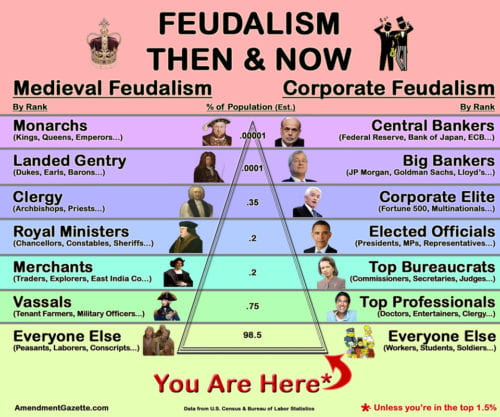As I move through high school, I learn about more and more recent history. In previous grades I studied ancient times such as old England and since then have moved all the way through to the 1950’s. For this post though, I’ll be doing a bit of a throwback by comparing a piece of the play Macbeth to the relatively modern times of the 50’s. How does Macbeth’s feudalistic economical structure relate to modern day capitalism?
Boiled down, this question is asking how much have we changed in the last 700 – 1000 years. The answer is a lot, but surprisingly not that much at the same time. To start to explain this I’m going to go over the similarities between these two economical ideas. Capitalism, the system we use along with the majority of the world is based upon the belief anyone in the world can start their own business, company, or create their own product. A capitalistic system also infers that this will be private and the government will not (usually) take any ownership or any part controlling said business venture. Capitalism is also an idea based on money (coins, bills) being commonplace opposed to using bartering for goods or land as a common currency.
Although feudalism isn’t really based around “money” it still has its similarities. In feudalism the king owns all the land. He then gives estates (large pieces of the kings land) to lords who repeat the process all the way down to peasants. This can be seen in Macbeth when king Duncan makes Macbeth the thane of Cawdor, essentially giving Macbeth rule over this new land. Peasants or even middle class people in feudalism usually didn’t own land. In the same scene, Banquo, who is Macbeth’s right hand man receives nothing but pleasant remarks from the king. These peasants and middle class men would work and part of their pay came in the form of room and board. We still use everything I just said in a rearranged way that substitutes their centralized currency (land and goods) for our centralized currency (money). Take Jeff Bezos, the founder and owner of Amazon. Let’s call him king. Jeff Bezos has all the money and the next man in line (most likely a CEO or an investor) doesn’t actually own nearly as much of the company he works for. Ownership is repeatedly split into smaller and smaller pieces until we get near the bottom of the company. These people at the bottom don’t own any of the company and in today’s society, Property isn’t actually proportionally owned by the lower or middle class due to inflated prices.
We do have one thing that the 1100’s will never have and that is a government that instates laws to make sure people at the bottom can still live (or at least they try) and that they might not be there forever. Capitalism also allows for anyone who has a new idea to make it their own and profit off of it themselves. One of the main flaws with  capitalism is that no matter what, there is always going to be people doing poorly if there are people doing well. There are other systems in use today like communism which make it harder to fail personally but also harder to rise above an succeed. Systems like communism often seem great on paper but when people realize they’re getting paid the same amount no matter how hard they work I’m sure you can see what’s going to happen.
capitalism is that no matter what, there is always going to be people doing poorly if there are people doing well. There are other systems in use today like communism which make it harder to fail personally but also harder to rise above an succeed. Systems like communism often seem great on paper but when people realize they’re getting paid the same amount no matter how hard they work I’m sure you can see what’s going to happen.
To conclude, we’ve come a long way from a feudalistic society. No more plotting against the king or calling upon witches to do your unholy bidding. At the end of the day no system is perfect. In my opinion capitalism seems the winner of all systems that have been used or are still being used today. With capitalism, hard work is rewarded and if you want something bad enough, you will have it.



That’s a really creative interpretation! I like the comparison of feudalism and also the incorporation of the present day example of amazon. The pictures are all relavent and make the post engaging! What inspired this comparison?